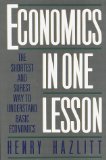Review: Economics in One Lesson #
(Photo: Amazon)
Review #
Economics in One Lesson (PDF version) is an excellent primer to economic thought. If I didn't know that it was published in 1940's, I could easily have assumed that it was a pamphlet discussing the modern financial, automotive, music, or newspaper industries.
The main purpose of the book is expose common economic fallacies that "are at last so prevalent that they have almost become a new orthodoxy" (Hazlitt vii). This is accomplished through two dozen "lessons" that derive from a single lesson summed up by Hazlitt as the essence of economics:
From this aspect, therefore, the whole of economics can be reduced to a single lesson, and that lesson can be reduced to a single sentence. The art of economics consists in looking not merely at the immediate but at the longer effects of any act or policy; it consists in tracing the consequences of that policy not merely for one group but for all groups. (emphasis his; Hazlitt 5)
The Broken Window #
The first of the "applied" lessons is based on the parable of the broken window as explained by Frédéric Bastiat.

(Photo: Wikimedia)
What follows is my brief paraphrase of the parable. Imagine a hoodlum throws a brick through a baker's window. The baker runs out of his shop and starts chasing after the rock-thrower, but is unsuccessful. As the baker walks back to his shop, a small crowd of people gather around the his window-less shop. After the customary outrage, someone points out a bright side: some glass-maker just got $200 worth of business. Moreover, the glass-maker can use those $200 to spend on other merchants who, in turn, can spend money on yet other merchants; the flow of money benefits all. The logical conclusion, then, is that the hoodlum should continue to break people's windows for the benefit of society.
If the conclusion sounds strange it is only because the crowd failed to consider the larger picture. While it is true that some glass-maker will receive $200 worth of business, it is also the case that the baker, who started the day with $200 and a window, is now left with only a window. That is, the net worth of society went down by the value of a window; that other windows can be manufactured is irrelevant because had the hooligan not broken the window, the baker would not need a new window.
While it may seem obvious that destruction leads to reduced net-worth, there are many ways of obscuring the destruction to make it more palatable to the masses, and Hazlitt covers many such fallacies in eminently accessibly prose.
The reader is urged to read at least the first two chapters of the book because many future posts will depend on understanding the "Fundamental Lesson of Economics" and it's applications.
Updates #
2023-11-28 #
- Updated broken links.
